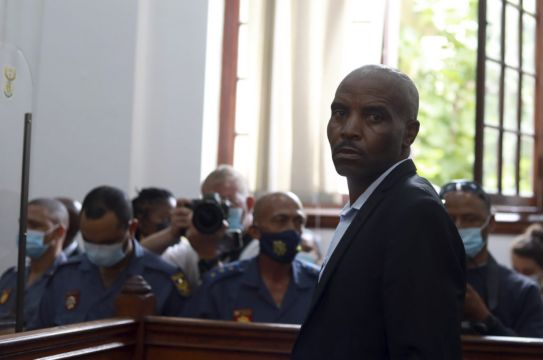A man accused of setting a fire that destroyed parts of South Africa’s historic parliament complex faces a new charge of terrorism.
Zandile Mafe, 49, appeared on Tuesday in a courtroom in Cape Town for a bail hearing, when the new charge was added, state broadcaster SABC said. He was sent to a psychiatric hospital for a month for assessment.
Mafe had already been charged with housebreaking with intent to steal, theft, two counts of arson and possession of an explosive device when he appeared in court the first time last week.
Prosecutors now contend that he had intended to “deliver, place, discharge or detonate” the explosive device at the parliament complex.

The site in Cape Town was ravaged by the major blaze, which started on January 2 and took firefighters four days to completely extinguish.
It destroyed the main chamber of the National Assembly building, where South Africa’s parliament sits, and also caused extensive damage to other buildings in the 130-year-old complex, which has been the site of the national legislature since the time of British colonialism in the late 1800s.
About 300 firefighters, some on cranes, worked for more than 70 hours to halt the blaze. No injuries were reported as parliament was closed for the end-of-year holidays at the time.
The size of the fire and damage caused immediately raised concerns that there had been an intentional attack on South Africa’s seat of democracy.
Mafe, who was described as homeless in his first court appearance, was arrested at the scene on the day the fire started and found with an explosive device, authorities said.
The investigation has been taken over by a South African police unit that deals with high-profile crimes, which said there could be more arrests.
The case has taken a number of strange turns since Mafe was first implicated, including rumours circulating online that he had received military training in Russia. That was denied by his family.

Mafe has denied the charges and his defence lawyer claimed he is being used as a scapegoat to cover up failings in parliamentary security.
Questions remain over why the fire sprinkler system did not work. Government minister Patricia de Lille said at the time that a water valve had been turned off, but a preliminary report into the blaze pointed out some failings in the fire safety plan and said parts of the fire sprinkler system had not been serviced as often as they should have.
The report also noted the system’s water valve should have been locked in the open position.
There was another development on Tuesday when lawyer Dali Mpofu, who is a prominent member of an opposition political party in South Africa, appeared at the Cape Town courthouse and said he was joining Mafe’s defence team.
He is also defending former South African president Jacob Zuma in his corruption trial.







